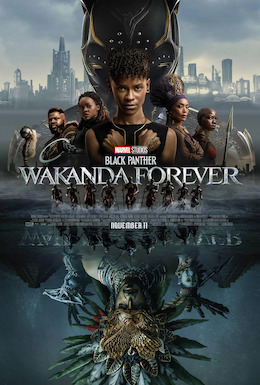Wakanda Forever comes racing out of the gates with an intense, devastating opening scene that gives Wright her first of many moments to shine as Shuri-whose arc in this film has the most interesting conflicts and nuanced emotions put behind it. Having Wakanda Forever get off to such an urgent, hard-hitting start just further crystalizes what kind of movie Coogler was aiming to make: A somber, thoughtful memorial for a man whose death was completely unexpected and the different journey's each person can take while trying to process such a sudden, impactful loss that just happens to be delivered in a $250 million blockbuster package.
There's a real raw sincerity to the emotions on display here that transcends the boundaries of Wakanda Forever's fictional narrative and conveys just how much Bosman's death affected his collaborators. The conversations about T'Challa and how Wakanda is going to move forward without him feel like the actor's way of attempting to process their feelings about Boseman's passing in real time and it's equally gut-wrenching and surprising to watch so many genuine feelings be expressed in a forum that doesn't exactly have a track record of showcasing these types of emotions. Coogler and these actors poured their whole hearts into paying tribute to Boseman and their efforts give Wakanda Forever the strongest emotional backbone that a Marvel film has ever had.
When Wakanda Forever veers off into its usual superhero business, the returns aren't as rewarding. To be fair to Coogler, the main plot dealing with how Wakanda is viewed as a weakening world superpower in the wake of T'Challa's death and the additional turbulent shockwaves that the royal family feels when they discover there's another deeply powerful nation out there led by a mutant god named Namor (Tenoch Huerta-who gives the character a real sense of nobility underneath all of the rage and hate he harbors for the outside world) that's ready to wage war to protect their people is a logical, effective way to cross its genre boxes while honoring its broader themes. While these parts of the movie are certainly very entertaining and not without their own moments of brilliance (the sequence in Namor's underwater homeland of Talokan, the new Black Panther's trip to the Ancestral Plane), a handful of big battle scenes, arguments about Vibranium and introducing a new hero in Ironheart (Dominique Thorne) feel kind of weightless when the focal point of the story is dealing with the difficult aftermath of a real-life death. This isn't meant to be a takedown of Coogler as he navigated his dual obligations here about as gracefully as he possibly could, but that doesn't change the reality that nearly every moment in Wakanda Forever where mourning Boseman/T'Challa isn't the focal point of the scene is a moment where this movie isn't being its best self.
Now, I fully understand that saying a superhero movie is doing itself a disservice by simply being a superhero movie is a ridiculous, if not completely disrespectful statement. However, Wakanda Forever's broader obligations to its genre is a detrimental shadow looming over the proceedings that it can never quite escape from. There's a full-blown masterpiece about grief, loss, love, family, legacy and the definition of heroism hiding in plain sight here, but its place in a broader franchise doesn't allow for these themes to receive the attention they needed to make a huge impact. As impressive as Wakanda Forever is as a tribute piece, this refusal to travel down a more pronounced emotional path makes it feel like somewhat of a missed opportunity other than a full-blown triumph and quite frankly, that's a shitty feeling to have about a movie that is driven by such a pure heart.
Grade: B+

No comments:
Post a Comment